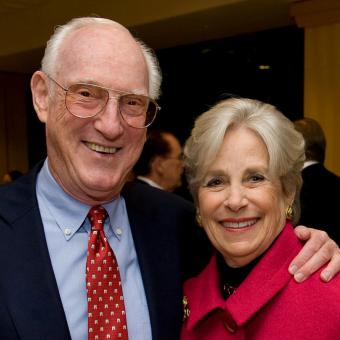Give to Support the Center
To keep the Stanford Humanities Center among the leading institutes of its kind, your help is indispensable.
Give online now
What We're Working On: A Vision for Our Next Era
Along with support for core programs, the Humanities Center is focusing on three initiatives:
- Inviting a public audience beyond campus to explore advanced research in new sites for the Stanford Humanities Center, the Center for Spatial and Textual Analysis (CESTA), and Arcade, now linked into a single platform entered through a gateway called Stanford Humanities Today
- Offering Next Generation Scholar Fellowships for Stanford graduate students
- By a renewed commitment to leading-edge speakers and events, demonstrating to the Stanford community the rigor and diversity of humanities research
How do these initiatives reinforce each other? The Next Generation Scholar Fellowships enlarge our intellectual community beyond Stanford, deepening the intellectual work we share with the world. Distinguished visitors to the SHC and CESTA further expand our horizons. And everything—including the work of our fellows, Research Workshops, spatial or textual projects at CESTA, and events—provides the rich content of our digital platform, which brings humanities research to a worldwide audience.
-
New Initiatives
-
An Outlet for the Public Humanities: Our Digital Platform
The site you are visiting now is part of an ambitious digital platform that makes the intellectual work of our community accessible to everyone. Many humanities centers share information about their activities on a website; the Stanford Humanities Center is a leader in offering not only information but high-quality content, permitting its visitors to encounter research and reflection in an unmediated way and to engage that content through comments and remixes.
This platform represents a significant investment in the transformative power of humanistic knowledge for a public outside the academy, or what is often called the public humanities. In the coming years we aim to provide a highly visible, interactive home for public-oriented projects connected to humanities research at Stanford.
Next Generation Scholar Fellowships
Like the digital platform, this initiative sets a national standard. As the job market has tightened, many of the most accomplished Stanford humanities PhD students find themselves requiring more than one year of dissertation support, or needing support later than the traditional model supposes. These situations extend the period of uncertainty between the end of conventional support and the beginning of a job or a postdoctoral fellowship. Now in their second year and growing, these late-stage fellowships provide PhDs with necessary funding to bridge their transition to a teaching position within the academy and to ensure they remain in the profession after Stanford’s substantial investment in them. The Stanford Humanities Center is unique in offering this kind of flexible support to get PhDs over the finish line—but the demand is great and more support is needed.
Original Programming
Our building and our digital platform reverberate with the sights and sounds of intellectual activity: new lecture series and other special events, reinvigorated core activities such as the Research Workshops, and hundreds of visitors—the largest and most diverse audiences in our 40-plus years. Everything we do has the aim of bringing research and perspectives from across the humanities to interpret our world.
-
Gift Opportunities
-
Making a multi-year pledge of three to five years is especially meaningful as we seek to expand our programs and share the work of humanities scholars with our community and the world.
Expendable Gifts
Annual Fund (<$10,000)
Annual Fund gifts support strategic campus partnerships and new, original programming that benefit the wider community.
Director’s Fund ($10,000 and above)
Director’s Fund gifts enable the SHC to advance the most urgent needs and priorities of the Center. This level of gift includes membership in the Director’s Circle.
Two International Visitors ($25,000/year per visitor)
(There is a naming opportunity for multi-year pledges)
Two Next Generation Scholar Fellowships ($50,000/year per student)
(There is a naming opportunity for multi-year pledges)
One External Faculty Fellowship ($125,000/year)
(There is a naming opportunity for multi-year pledges)
Gifts to Endowment
External Faculty Fellowships ($2.5M per fellowship)
(There is a naming opportunity for gifts to endowment)
Next Generation Scholar Fellowships ($1M per fellowship)
(There is a naming opportunity for gifts to endowment)
For the Stanford Humanities Center to fulfill its leading role among institutes of its kind, it must have the necessary funding to realize its vision. Your leadership investment is critical to transforming the Center’s programs for the 21st century.
For more information, contact Susan Sebbard, Assistant Director, at sebbard@stanford.edu or 650-723-3053.
-
Ways to Give
-
There are many ways to support the Center, only some of which entail making an immediate cash gift. For example, you might consider writing the Humanities Center into your estate plans, making a pledge, or transferring stock. We welcome gifts at all levels—every dollar counts.
Make a one-time or recurring gift online
To make a one-time or recurring gift online, please visit: http://pgnet.stanford.edu/goto/HumanitiesCenterGift
Make a gift by check
Checks should be made out to “Stanford University” and mailed to: Stanford Development Services, PO Box 20466, Stanford, CA 94309-0466. Please include a note that your gift is intended for the Stanford Humanities Center.
Make a pledge
A pledge is a formal statement of intention to make a gift in support of the Center. This kind of gift permits you to stage payments over time and complete the pledge on the schedule that is best for you. To make a pledge visit: http://pgnet.stanford.edu/goto/HumanitiesCenterGift
Transfer stock sales
Transferring stock to the Center allows you to support the humanities while realizing tax benefits. A gift of appreciated stock is deductible from your income tax and avoids the capital gains tax that would result from selling the stock.
Matching gifts
Many employers match charitable gifts made by their employees. Find out if your employer matches charitable contributions, and ask them for a matching gift form to send in with your gift.
Donate Your Honorarium
Humanities Center fellows and friends can support the Center by donating honoraria received for professional services. Fellows, former directors, workshop coordinators, Stanford faculty, or anyone else wanting to support the Center, may allocate fees received for giving lectures, reviewing manuscripts, serving on selection committees, etc., as a donation to the Center.
Your donation provides essential annual support for the Center's programs and ensures the successful promotion of humanistic research and education at Stanford and around the globe. Donors will be listed in our publications unless they instruct otherwise.
Once you have received your honorarium or fee, you can write a check in that amount and mail it to the Stanford Humanities Center, 424 Santa Teresa Street, Stanford, CA 94305-4015. The check should be made out to “Stanford University” and include a note that it is intended as a donation to the Humanities Center.
Thank you for considering this avenue of support. All questions about donating honoraria should be directed to Susan Sebbard at sebbard@stanford.edu or 650-723-3053.
-
Planned Giving & Bequests
-
Since its founding, the Stanford Humanities Center has built a community passionately engaged in the fundamental task of understanding what it means to be human. A bequest allows you to realize your philanthropic goals and guarantee the vitality of this dynamic community for future generations.
If you have any questions about giving to the Humanities Center, please contact Assistant Director Susan Sebbard at 650.723.3053 or send an email to sebbard@stanford.edu.
What is a bequest?
Simply put, a bequest is a gift from your estate. You can make a bequest in your will or living trust by designating an exact dollar amount or a percentage of your estate. Or you might consider naming the Stanford Humanities Center as a beneficiary in your retirement plan or life insurance policy.
A bequest is free from federal estate taxes and income taxes. By planning now, you can designate your assets for charitable use and ensure that the Stanford Humanities Center continues to enrich our understanding of human history and cultures for generations to come.
What other planned giving options do I have?
Life income gifts are another planned giving option that provide for you now and the Humanities Center later. They also offer significant tax advantages. Charitable remainder trusts, gift annuities, and pooled income funds, are some examples of such gifts.
When you establish a life income gift, you irrevocably transfer cash, securities, or other property to Stanford. The university then manages the investment of the assets and pays an income to you or your beneficiaries for life. Thereafter, the remaining assets from your gift go to support the Stanford Humanities Center.
How do I make a bequest?
Making a bequest to the Stanford Humanities Center is easy. You may create a new will or living trust, add a codicil to your present will, or amend your present trust instrument. To ensure that your exact intentions are implemented in harmony with the rest of your estate plan, estate planning documents should be prepared in consultation with your attorney.
If you are planning a simple bequest to the Stanford Humanities Center, the following language can be used:
I hereby give ______________ to THE BOARD OF TRUSTEES OF THE LELAND STANFORD JUNIOR UNIVERSITY, an educational institution. This gift shall be fully expendable and shall be used to support the Stanford Humanities Center.
Who do I contact about making a bequest?
If you are planning a detailed bequest, or if you would like more information about your planned giving options, you may contact Susan Sebbard at 650.723.3053 or sebbard@stanford.edu.
You can also contact Stanford's Office of Planned Giving directly at 800.227.8977, ext. 54358, or planned.giving@stanford.edu. Stanford's team of planned giving experts can help you with everything from simple bequests to gifts of retirement plan assets, life insurance, real property, appreciated securities, and the complete range of life income gifts.
What are the benefits of making a bequest?
• A bequest costs nothing now, but helps to secure the future of the Stanford Humanities Center.
• A bequest is free from federal estate and income taxes.
• A bequest allows you to retain control of your assets during your lifetime and modify your charitable designations should you so choose.
• If you notify the Stanford Humanities Center or the university of your bequest, you will be included as a member in Stanford's Founding Grant Society. It would be our privilege to be able to thank and recognize you now.

The humanities are the building block for everything we learn. The Stanford Humanities Center epitomizes the highest quality of humanities research and scholarship at every level of the university.





